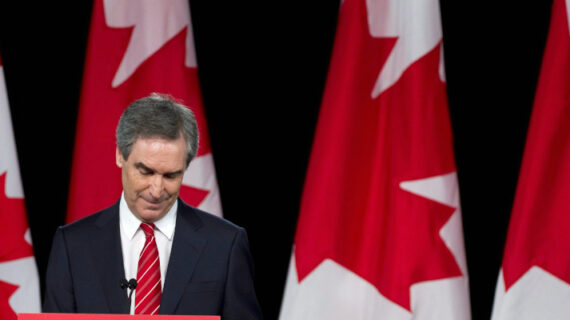Today’s Hub Dialogue is with Parag Khanna, a thinker, writer, and futurist. He’s worked at the World Economic Forum, the Council of Foreign Relations, the Brookings Institution, and has advised governments, policymakers, and business leaders. Parag has thought a lot about the intersection between economics, culture, politics, and technology.
His newest book, Move: The Forces that Uproot Us, makes the argument that a series of forces—including climate change—will contribute to a massive wave of global migration in the twenty-first century that will reshape societies and geopolitics.
This conversation has been edited and revised for length and clarity.
SEAN SPEER: Thanks for joining us, Parag, and congratulations on your fascinating, new book.
PARAG KHANNA: Thanks so much for having me join you.
SEAN SPEER: Let’s start big picture. Your book sets out the concept of “human geography.” What is human geography? And why should business leaders, policymakers, and regular citizens be concerned with it?
PARAG KHANNA: I’m so glad that you began with that question, Sean. Human geography is one of those fundamental layers that we have to understand the world. It’s the geography of us. It’s our distribution around the world as a human species, and it matters for many reasons.
First of all, we take it for granted, but it is dependent on the location of resources, borders, economic activity, industry, and so forth. And as those trends shift, and of course they are shifting rapidly, that affects where we can and cannot live and survive. So, if you want to predict what the thriving markets of the future are going to be, you need to know where the people are going to be.
Now that matters more than ever, because one big part of human geography is demographics. The world population is entering a plateau demographically. We are reaching what I call peak humanity: our numbers will probably never reach 9 billion people, which is a far cry from the 15 billion predicted.
Now, this is good for the planet, but economically it can be devastating, because entire societies are already depopulating. Look at Japan and much of Western Europe. In fact, Canada and the US are also at the early sub-fertility levels.
The other piece of the puzzle is migration. If you want to know where innovation and dynamism is going to be in the future, you need to know where young people are migrating to in a demographically deflating world. I would go so far as to say (and this is basically one of the punchlines of the book) that, first of all, collecting people is collecting power. The winning societies won’t be populist and xenophobic. The second thing is that we are in a war for young talent, and countries that collect young people will be the winners of the future. The countries that are losing young people will be wiped off the map. You’ll be pleased to know that Canada is a big winner heavily featured in the book, and for all the right reasons.
SEAN SPEER: That’s great. We’ll come back to the question of Canada at the end. But now that we’ve set that big picture, let’s come to your main thesis: you envision a future marked by mobility and migration. What forces will drive that renewal of large-scale population flows around the world?
PARAG KHANNA: Great question. I’m glad you used the word renewal because up through 2019, we had reached a record number of annual migrants. As many as 1.5 billion people had crossed international borders, which could be tourists, business travelers, and people who are relocating. There are almost 300 million people who are living outside of their country of origin, which are also record numbers. A lot of people have come to think, “Oh well, the pandemic just killed that“, and that somehow we’ll enter a period of permanent stagnation or decline when it comes to global mobility.
That’s not at all true. Because as I identify in the book, there are five or six major drivers of human international mobility. One is labour shortages. Those are more intense than ever before. Another is demographic imbalances, including the gap and mismatch between old and young. That too is more extreme than ever before. Political upheavals, like state failures, are a major rolling problem, from the Arab Spring to Afghanistan, and parts of Africa that are now failing. Then there’s technological automation, which will cause people who get automated away from their jobs to be forced to move to places that they can afford to live and look for new work. People who can be digital nomads now because of technology can also choose where they want to live. And then there’s climate change on top of all of that. You have climate change as perhaps the biggest driver in history; the past and certainly the future of where people move to. So, if I stack up all that evidence, can you still tell me with a straight face that you think that the pandemic ended human migration?
SEAN SPEER: In light of these trends and their consequences for mobility and migration, what should countries be doing now in terms of infrastructure investment, refugee programming, or other preparations that can have a long lead time to an anticipated century marked by these tremendous population flows and a competition for talent around the world?
PARAG KHANNA: Part of it is to not view migration through the lens of migration, and in turn to make it a cultural, emotional, hot button, short-term political issue, but rather to think about it in terms of a national economic master plan. Surely, whatever country you live in, you would hope that your government, corporate leaders, civil society, and educational institutions together are forging a national economic strategic plan. If they’re not, that’s one sign that you should leave that country.
Now, let’s take the next step. Your country has committed to doing a strategic economic plan; therefore, it needs to know, “What industries they want to cultivate? What are the skill sets that are needed for workers to contribute to innovation in that sector? What investments are needed to make it aware? How does its educational system train workers to thrive in those industries, as it diversifies and tries to become more competitive?”
Then you go to the third set of questions, “What kind of people do I need? Do I have the people I need for those sectors? If not, I need to get them, I need to recruit them.”
Then you need to go out in the world and find them. That’s where migration comes in. Not as the first hot-button, emotional issue, but rather as a consequence of a strategic conversation about what is best for your country. That’s what Canada does extremely well. It’s second to none, quite frankly, in this regard, and other countries are learning.
There are almost 300 million people who are living outside of their country of origin.
SEAN SPEER: What is the biggest threat to a future of mobility and migration? Is it a renewed great power competition between the United States and China and the bifurcation of economic and political systems? What about the rise of nationalism?
PARAG KHANNA: I actually don’t set up one future. There are four scenarios in the book and quite frankly, three of them are rather pessimistic, and they involve all manner of nationalism, protectionism, xenophobia, great power competition, scramble for resources, water wars—you name it.
Most of the book is that, but there is one scenario that I called “Northern Lights.” That involves a gradual, strategic, peaceful resettlement of the human population in ways that are beneficial to everyone, in which there’s a focus on assimilation, new infrastructure, sustainability, mobility, connectivity, and so forth. All those good things. I don’t guarantee, promise, or give a probability to any one outcome, but I describe all of them.
And I’ll be honest, I’m not necessarily optimistic on any given day. Great power competition doesn’t have to go away, fade away or dissipate in order for us to have, for example, a race to the top in terms of environmental technology. Great power competition is also thriving today in the form of a desire to be more self-sufficient and more resilient in one’s local or regional energy systems. So, great power competition could also be fueling a positive scenario. The great power competition inherent in China’s Belt and Road initiative is building lots of infrastructure that lots of other countries can use for their trade routes. Some things that are done in the name of geopolitics can also have global public benefits.
Nationalism is something that we talk about more than exists in reality. I have a section of the book where I look at conscription policies around the world, and to my knowledge, no one has done a global study of conscription practices and the quest of young men to avoid them. But because global youth are the protagonists of this book, many young men all over the world face conscription. Surely, if you’re a patriot in a nationalist society, you will do your patriotic duty, and you will welcomingly comply with your military conscription. Yet that’s not what is happening. The rite of passage for an 18 year-old man from Korea, Turkey, wherever in the world, is to buy and bribe their way out of military service and to escape their country as quickly as possible. That somewhat betrays the notion that we live in some world which is populated by rabid nationalism.
Nothing of the sort is actually true. Countries in which there are bouts or spasms of nationalism and populism, and so forth, those governments don’t tend to last very long, and they’re hardly admirable societies. So, if you look at the U.S., Trump is gone. It’s easier to migrate to the U.K. right now than it was before Brexit, because the reality is that they learned their lesson. They had massive shortages of truckers, nurses, doctors; basically, shortages of everything. And they realized, “Oh my goodness, now we have to beg people to come and live here.”
Let’s be clear that what we talk about in our headlines is a simplified and utterly misleading characterization of policies. And then again, you really can’t generalize about the West being inward looking and populist because last time I checked, Canada, Germany, and other countries that are mass migration societies are part of the West also.
SEAN SPEER: What would you say to those who would argue that these massive global population flows undermine the human capital of poor countries to the benefit of the innovation, dynamism and diversity of rich countries? Is that a problem? Is that something we should care about?
PARAG KHANNA: We’ve cared about and had a debate about brain drain for a very long time. On balance, the fact is that it’s proven to be beneficial. As of 2018-2019, the value of remittances inflows to developing countries was greater than the foreign direct investment and overseas development assistance going into those same countries. So, please tell me how you would help those countries survive, were it not for taking in their people to be workers in your country, and allowing them to send remittances back? They would be dying; their conditions would be even worse than they are right now because you haven’t been compensating by way of greater investment and greater aid. Remittances are absolutely a lifeline, and it’s quite frankly immoral to be against the movement of people and the movement of workers. The best economists in the world have a universal consensus on this question, so I don’t really feel that it’s even a matter for debate now.
So, should we do all those other things as well, however, in terms of investment and job creation, skill building, and aid into those countries? Sure, we should do all of those things. But there’s also no substitute for brain drain, which is to say, allowing people to fill the labour shortages in our society. It certainly makes us better off, and it provides tremendous value in their home countries.
There’s no substitute for brain drain, which is to say, allowing people to fill the labour shortages in our society.
Look at what has been called the motherhood penalty during the pandemic. They’re basically two kinds of societies during the pandemic: one where women had to drop out of the labour force to take care of kids who were home when the schools closed; and another where there was abundant childcare, by way of having to some degree, imported labour to serve in childcare as nannies and babysitters. Now of course, you would say that it’s more civilized to be in a place where women can continue to rise up the corporate ladder, and are not penalized in the workplace because of this pandemic. Well, it turns out that the places in the world that tick that box were places where you have a very high degree of foreign, migrant labour, like Singapore, Dubai, and so forth. No Singaporean woman that I know has suffered the indignity of having to quit their job during this pandemic.
So, it’s grossly unfair to be against the immigrants that help our societies actually become as productive and have the high standard of living that we expect to have. Just ask them; go interview all the nannies, cooks, and cleaners all across Canada and ask, “Would you rather be back at home and unemployed? Or do you rather be here in Canada, and as sad as it is to be away from your family, to be able to send that money back home?” I don’t think you’d really have a whole lot of variation in the answers.
SEAN SPEER: Yeah, they’re voting by their actions.
PARAG KHANNA: Voting with their feet, absolutely.
SEAN SPEER: Last question. You’ve alluded a couple of times to how Canada is well positioned in this century of mobility and migration. Do you want to just paint a picture for our readers about what all of these trends and these forces that you highlight in the book may mean for Canada?
PARAG KHANNA: Sure, absolutely. Canada does get more than an honourable mention in the book; it’s quite centrally featured. I think you’re doing the right things and a lot of ways, over the last couple of years, you’ve maintained that commitment to a heavy, pro-immigration strategy in your most recent election. It wasn’t heavily politicized and you have a national consensus on the issue.
You see the data around where the labour shortages are. Your points-based system is very transparent, and you’re letting foreigners, skilled and unskilled, to come in. You’re providing training and providing housing. Canada is doing a lot of those things.
Obviously, you always have to account for geography and climate, and the fact is that Canada is in the right place at the right time to be doing these things. In a world in which there’s significant migration and mobility, a country with a good policy framework, that’s pluralistic and welcoming, and has a lot of space that won’t be devastated by climate change is extremely well positioned. Russia has a similar latitude and country size, but for a very different historical set of circumstances, it’s not been a mass immigration society for the last 200 years the way Canada is. Other countries will have to learn a lot from the Canadian experience. But as I say, in the book, collecting people is collecting power, and Canada is well on its way to becoming a demographic superpower, and that is extremely well-timed for the wellbeing of the world.
SEAN SPEER: The book is MOVE: The Forces Uprooting Us and, as you’ve just laid out for our readers, it persuasively argues that we ought to put the question of human geography at the centre of our understanding of some of these big economic, cultural, political, and social trends that will unfold in the coming decades and century. Thank you so much for joining us, Parag.
PARAG KHANNA: Thank you so much, Sean. Such a pleasure to join you.




